
Ukrainian Food Journal
Scope & Guideline
Unveiling breakthroughs in food technology and safety.
Introduction
Aims and Scopes
- Food Technology and Processing:
The journal focuses on the technological aspects of food processing, including the development and optimization of methods for food preservation, fermentation, and quality enhancement. - Nutritional Science and Health:
Research on the nutritional profiles of various food products, including studies on bioactive compounds, functional foods, and their implications for health and wellness. - Food Safety and Quality Assurance:
Emphasis on the safety standards and quality control measures necessary for food production, exploring topics like microbial safety, chemical contaminants, and sensory evaluation. - Sustainable Food Production:
Investigation into sustainable practices in food production, including the utilization of by-products, eco-friendly packaging materials, and waste reduction strategies. - Consumer Behavior and Food Trends:
Analysis of consumer preferences, dietary habits, and emerging trends in food consumption, providing insights into market dynamics and product development.
Trending and Emerging
- Functional Foods and Nutraceuticals:
There is an increasing focus on the development and evaluation of functional foods that offer health benefits beyond basic nutrition, including studies on bioactive compounds and their effects. - Innovations in Food Packaging:
Research on biodegradable and eco-friendly packaging materials is rising, highlighting the industry's shift towards sustainability and environmental consciousness. - Food Waste Management:
Emerging studies are addressing food waste reduction and management strategies, emphasizing the importance of sustainability within the food supply chain. - Plant-Based and Alternative Proteins:
With the growing interest in plant-based diets, the journal is seeing more research on alternative protein sources and their applications in food technology. - Impact of Technology on Food Production:
The integration of advanced technologies such as AI, machine learning, and automation in food production processes is becoming a prominent theme, reflecting the industry's adaptation to modern challenges.
Declining or Waning
- Traditional Food Preservation Techniques:
There has been a noticeable decline in publications concerning traditional methods of food preservation, possibly overshadowed by modern technological advancements and innovative preservation methods. - Historical Analysis of Food Practices:
Research focusing on historical practices in food production appears to be waning, with less emphasis on retrospective studies and more focus on contemporary issues and future trends. - Regional Specific Studies:
Papers that concentrate solely on regional food issues or practices are becoming less frequent, as there is a growing trend towards global perspectives and comparative studies.
Similar Journals
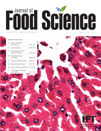
JOURNAL OF FOOD SCIENCE
Bridging Research and Application in Food ScienceJOURNAL OF FOOD SCIENCE, published by Wiley, is a premier journal dedicated to advancing the field of food science, bridging the gap between fundamental research and practical application. With an impressive impact factor reflecting its authoritative status, the journal is ranked in the Q1 quartile for Food Science in 2023 and boasts a Scopus ranking of #71 out of 389, placing it in the 81st percentile within Agricultural and Biological Sciences. First launched in 1936, the journal continues to serve as an essential platform for researchers, professionals, and students to disseminate innovative studies and reviews that address critical issues in food quality, safety, and technology. While not currently offering open access, its rigorous peer-review process ensures the dissemination of high-quality and impactful research. Researchers engaged in the vital disciplines of food science will find this journal indispensable for keeping abreast of cutting-edge developments in the field.

Acta Scientiarum Polonorum-Technologia Alimentaria
Exploring the Future of Food TechnologyActa Scientiarum Polonorum-Technologia Alimentaria, published by Poznan University of Life Sciences, is a revered journal in the field of food science, showcasing cutting-edge research and innovations in food technology. Established as a leading platform within its domain, this journal is indexed under Scopus and ranks in the 2023 Q3 quartile for Food Science, demonstrating its commitment to high-quality scholarship. With an ISSN of 1644-0730 and E-ISSN 1898-9594, it serves as a critical resource for researchers, professionals, and students seeking to stay at the forefront of advancements in food safety, quality control, and sustainable practices. The journal has also been recognized for its contributions to the agricultural and biological sciences, positioning itself at rank #205 out of 389 in this competitive field. While currently not offering open access, the journal's valuable insights and findings, especially as it publishes through 2024, play a crucial role in advancing knowledge and fostering collaboration among experts in the food science sector.

Journal of Food Science and Technology-Ukraine
Connecting Global Minds in Food Technology ResearchJournal of Food Science and Technology-Ukraine, published by the Odesa National University of Technology, stands as a pivotal platform dedicated to the dissemination of high-quality research in the field of food science and technology. With its open access policy established in 2014, the journal fosters global knowledge sharing and accessibility, enabling researchers, professionals, and students to access critical findings and advancements in food technology without barriers. The journal's commitment to publishing innovative studies, reviews, and case analyses reinforces its role in addressing contemporary challenges in food safety, preservation, processing, and nutritional quality. With ISSN 2073-8684 and E-ISSN 2409-7004, it serves as a valuable resource for the academic community, supporting the advancement of food science knowledge and its practical applications.

ACS Food Science & Technology
Unveiling the Science Behind Every BiteACS Food Science & Technology is a premier peer-reviewed journal published by the American Chemical Society (ACS) that addresses the dynamic intersections of food science, chemistry, and technology. With its E-ISSN: 2692-1944, this journal aims to disseminate innovative research and comprehensive reviews that enhance understanding in fields such as analytical chemistry, organic chemistry, and general food science. Despite the absence of an Open Access model, its position in the Q2 quartile for multiple categories in 2023 underscores its significant impact on the scholarly landscape, ensuring researchers can access high-quality research pertinent to today's food challenges. With an expanding timeline of 2021 to 2024, ACS Food Science & Technology is poised to be an essential resource for advancing the scientific community's knowledge, fostering collaboration, and bridging gaps between academia and industry.

COMPREHENSIVE REVIEWS IN FOOD SCIENCE AND FOOD SAFETY
Navigating the Landscape of Food Science with AuthorityCOMPREHENSIVE REVIEWS IN FOOD SCIENCE AND FOOD SAFETY, published by Wiley, is a premier journal dedicated to advancing the understanding of food science and safety through thorough and critical reviews. With an impressive Q1 ranking in the field of Food Science and a notable Scopus ranking of #4 out of 389 in Agricultural and Biological Sciences, this journal occupies a vital position within the academic community. Its rigorous approach to publishing comprehensive reviews serves as an invaluable resource for researchers, professionals, and students aiming to stay abreast of current trends and advancements in the food sector. Although the journal does not offer open access options, its contributions from 2002 through 2024 reflect a commitment to high-quality scholarship and knowledge dissemination. Researchers looking to elevate their understanding of food safety and related disciplines will find this journal an essential addition to their academic repertoire.
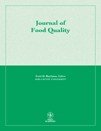
JOURNAL OF FOOD QUALITY
Innovative Research for a Healthier Food FutureThe Journal of Food Quality, an esteemed publication under Wiley-Hindawi, stands as a vital resource in the dynamic field of Food Science, established since 1977 and operating under an Open Access model since 2017. With its seat in the United Kingdom, this journal focuses on delivering high-quality research and insights pertaining to food safety, risk management, and quality assurance, reflected in its impressive Q2 ranking in both Food Science and Safety, Risk, Reliability and Quality categories in 2023. Researchers and professionals will find the journal’s contributions indispensable, particularly given its Scopus rankings that place it in the top echelons of its fields, highlighting its impact and relevance. By fostering an environment of knowledge sharing, the Journal of Food Quality not only enhances academic dialogue but also supports innovation and best practices in food research and industry applications.

Food Production Processing and Nutrition
Exploring nutritional insights through cutting-edge research.Food Production Processing and Nutrition, published by SpringerNature, stands at the forefront of advancing knowledge in the vibrant fields of food science, nutrition, and public health. This esteemed Open Access journal, operational since 2019, plays a pivotal role in disseminating breakthrough research that intersects food production processes with nutritional insights, making it an invaluable resource for researchers, professionals, and students alike. With a commendable 2023 impact factor reflecting its robust scholarly contributions — Q1 in Food Science and Q2 in both Nutrition and Dietetics and Public Health, Environmental and Occupational Health — the journal not only emphasizes the importance of innovative food processing methods but also addresses pressing nutritional challenges faced globally. Located in the United Kingdom, it claims an impressive Scopus ranking, with a notable percentile standing across various categorical metrics. As such, Food Production Processing and Nutrition is essential for anyone aiming to deepen their understanding of how food systems impact public health through effective processing and nutritional strategies.
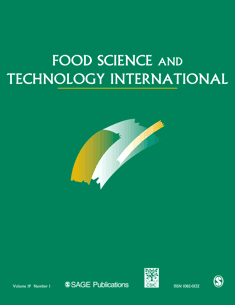
FOOD SCIENCE AND TECHNOLOGY INTERNATIONAL
Fostering knowledge and innovation in food science.FOOD SCIENCE AND TECHNOLOGY INTERNATIONAL, published by SAGE Publications Ltd, is a premier journal in the fields of food science and technology, serving as a crucial platform for the dissemination of innovative research and practical applications from 1995 through to 2024. With an impact factor reflecting its significant standing—ranking in the Q2 quartile for Chemical Engineering, Food Science, and Industrial and Manufacturing Engineering—this journal plays an instrumental role in advancing the interdisciplinary study of food systems. Researchers, professionals, and students can access high-quality contributions that address the latest developments and trends in food technology, safety, and processing. Located in the United States, FOOD SCIENCE AND TECHNOLOGY INTERNATIONAL also boasts commendable Scopus rankings, ensuring its articles are both relevant and widely cited within the academic community. As a vital resource for anyone engaged in food science research, этот журнал fosters knowledge sharing and innovation in the ever-evolving landscape of food technology.
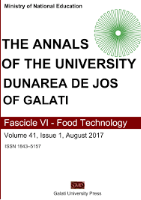
Annals of the University Dunarea de Jos of Galati, Fascicle VI-Food Technology
Exploring the Frontiers of Food TechnologyAnnals of the University Dunarea de Jos of Galati, Fascicle VI-Food Technology is a distinguished academic journal published by GALATI UNIV PRESS, dedicated to advancing knowledge in the field of food technology. With an open access format since 2007, this journal enhances accessibility to research findings and facilitates the dissemination of innovative ideas among researchers, professionals, and students worldwide. The journal holds a noteworthy position in its category, boasting a 2023 Q3 ranking in both Food Science and Industrial and Manufacturing Engineering, indicating its relevance and contribution to these critical fields. As it converges years of publication from 2012 to 2023, it encapsulates an evolving body of knowledge that reflects the latest advancements and research trends. Although it may not yet have a defined HIndex, its presence in Scopus with ranks of #253 in Industrial and Manufacturing Engineering and #278 in Food Science underscores its emerging impact. This journal is particularly significant for those engaged in research related to food technology and engineering, facilitating dialogue and collaboration within the community while addressing pressing challenges and innovations in food processing and safety. With its commitment to quality research, Annals of the University Dunarea de Jos of Galati serves as an essential resource for fostering knowledge and promoting scientific discussion.
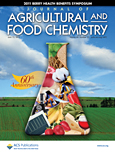
JOURNAL OF AGRICULTURAL AND FOOD CHEMISTRY
Advancing the Science of Food and AgricultureJOURNAL OF AGRICULTURAL AND FOOD CHEMISTRY, published by the American Chemical Society, serves as a premier platform for disseminating cutting-edge research in the field of agricultural and food chemistry. With an impressive impact factor and ranked in the Q1 quartile for both Agricultural and Biological Sciences and Chemistry categories, this journal is recognized for its high-quality contributions that influence practices in food safety, nutrition, and agricultural productivity. Since its inception in 1953, the journal has dedicated itself to providing valuable insights and innovative approaches to complex challenges facing these intertwined fields. Researchers and professionals in academia and industry alike will find the JOURNAL OF AGRICULTURAL AND FOOD CHEMISTRY to be an essential resource for advancing knowledge and fostering collaboration in agricultural sciences and food chemistry.